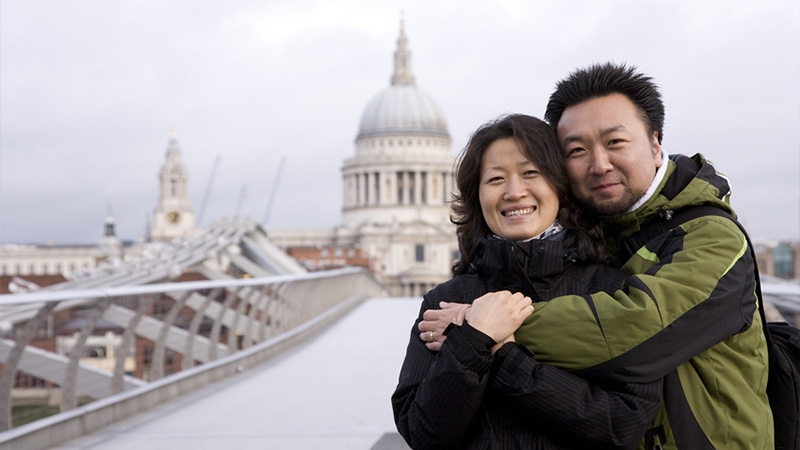Fixed fees and easy payment plans. Call 08448 044 128 to see how we can help you.
Find out how Ruth got her visa
Are you in a relationship with someone who is settled in the UK?
The Immigration Rules allow for applications from people who are in a relationship with a ‘settled’ person – that is, where your partner is British, has Indefinite Leave, or has been granted Refugee Leave. You have to show, however, that there are “insurmountable obstacles” as to why your relationship cannot continue overseas, and why you should therefore be allowed to remain in the UK.
An insurmountable obstacle is described in the Immigration Rules as a very significant difficulty which could not be overcome, and which would cause very serious hardship for you or your partner. This is a very high standard and before you consider making an application on the basis of your relationship with a settled person, you need to have very strong reasons as to why your relationship cannot survive anywhere but in the UK, and also why you cannot return to your home country to make the application, which is what the Immigration Rules require you to do.
Do you have children who are British, settled or resident for 7 years?
Another situation in which it is possible to regularise your status is if you have children who have a right to live in the UK – so that is, children who are British or who have Indefinite Leave to Remain. If the children are here illegally, or have visas but are not settled in the UK, then they need to have lived in the UK for at least seven years.
Decision makers have a positive duty to have regard for the welfare of any child in the UK, but while the welfare of the child is an important issue, it is not the only issue, and has to be looked at along with all the other factors of the case.
The test in this case is whether or not it would be “reasonable” to expect the child to leave the UK. This, of course, is subjective, so that two different people looking at the same facts could come to two different conclusions about what is or is not reasonable. As always when making an application to remain in the UK, you have to prove your case, and the closer the links you can show with your child, the greater the chance of your application being successful.
Is your partner an EEA national?
Citizens of the countries of the European Economic Area (EEA) are not subject to UK immigration law, and neither are their family members – instead, their immigration status in the UK is regulated by EEA law. In general, the requirements of EEA law are easier to meet than the requirements of UK law, but you can only benefit from EEA law if your partner is not also a British citizen – the families of dual nationals are subject to UK law.
EEA law doesn’t treat you less favourably if you are in a same sex relationship, but it does make a difference between couples who are married or in a civil partnership, and couples who are merely living together. You have far more rights if you are married or in a civil partnership – if you are living together then you will first of all need to satisfy the Home Office that you are in a ‘durable relationship’. There is no definition of what a durable relationship is, but generally the Home Office will expect you to have lived together for at least two years.
Under EEA law the status of the EEA citizen is of primary importance, and your EEA partner will generally need to be working, self-employed or studying in the UK. If your partner is not working you will almost certainly not be able to make an application, unless he or she has become ‘settled’ in the UK because of previous work or study.
Have you lived in the UK for the required number of years?
The ‘private life’ route has replaced the old 14 year route, and allows people who have been in the UK for a considerable period of time to apply to regularise their stay. It has offered some concessions that weren’t in the earlier Rules, but on the other hand has taken away the immediate settlement that you got with a successful application under the 14 year route – you now become eligible to apply for settlement 10 years after you are first granted leave on the basis of your private life. There are three main strands to the private life route:
Children who have lived in the UK for at least seven years can apply, though you need to show that it would not be ‘reasonable’ to expect the child to leave the UK. What will be considered reasonable is not defined, but it is important to show how integrated the child is to life in the UK.
Young people aged between 18 and 25 can apply if they have lived in the UK for at least half their lives, and people who have lived in the UK for at least 20 years can also apply. These are very evidence-based applications, and so the more documents you have to show that you have lived in the UK for this length of time, and the more ties you can show to the UK, the greater the chance of your application being successful.
The Immigration Rules also allow people who have lived in the UK for less than 20 years to apply on the basis of their private life, but only if they can show that they have no ties at all with their home country – in the words of the Rules, no ties including social, cultural or family. In other words, you have to prove that you have no friends from your own community and haven’t spoken to your family since you left. It is almost impossible to make a successful application on this basis.






